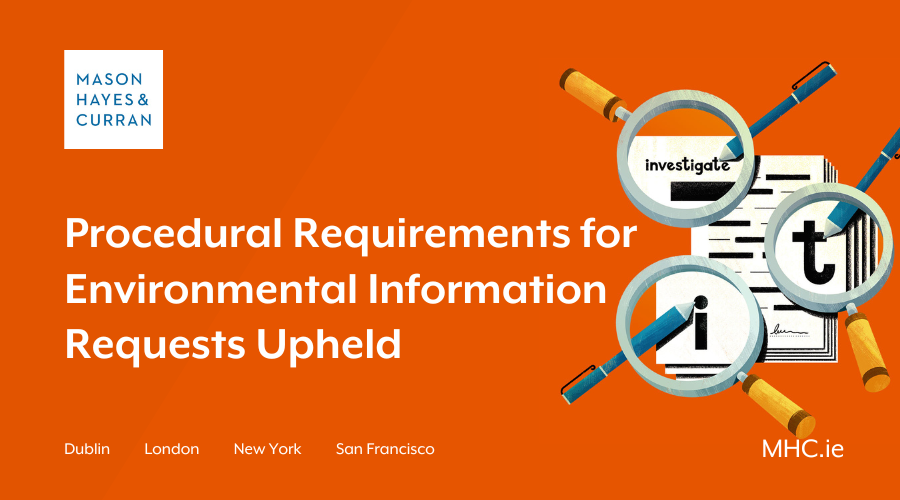
The Access to Information on the Environment Regulations 2007-2018 (AIE Regulations) were made under section 3 of the European Communities Act 1972 to implement Directive 2003/4/EC (AIE Directive).
This case stemmed from a request to the Taoiseach’s Department by an NGO, Right to Know (RTK), for environmental information. The request did not specify that it was being made under the AIE Regulations. The Department sought clarification as to whether the request was being made under the Regulations, or the separate and distinct Freedom of Information (FOI) Act, under which the environmental information could also be requested. The Department further noted that Article 6(1)(b) of the AIE Regulations provided that any request under those Regulations had to state that the request was made under the Regulations, and asserted that, without further clarification, the request could not be processed. RTK declined to make that clarification, and sought an internal review of what it considered to be a refusal of its request. The Department did not entertain that internal review request, and no information was released. RTK brought judicial review proceedings seeking to quash the implied refusal to carry out an internal review or to release the information sought.
The High Court dismissed RTK’s central argument which was essentially that the AIE Directive simply contemplated a request for, and provision of, environmental information, and that it neither required nor permitted the obligation under Article 6(1)(b), which places an onus on a requestor to specify that the AIE Regulations are being invoked.
RTK subsequently appealed to the Court of Appeal.
The Directive
The Directive does not contain any specific procedural rules by which requests for access to environmental information are to be processed.
Delivering judgment for the Court, Ms Justice Faherty, pointed out that generally where an EU directive does not set out procedural rules for implementation, it is for Member State to determine those rules.
Ms Justice Faherty noted that the Directive also specifically referred in various places, including Article 3(5), to “practical arrangements” being made at Member State level. She accepted that there was nothing in Article 3(5) of the Directive necessitating a requirement like Article 6(1)(b); however, Article 3(5) of the Directive clearly envisaged Member States implementing “practical arrangements” which ensured that the right of access to environmental information could be effectively exercised. Of course, any such practical arrangement could not amount to a restriction on access to environmental information, otherwise it would contravene the Directive’s spirit. Therefore, the question ultimately was whether Article 6(1)(b) of the AIE Regulations could be understood as a practical arrangement which facilitated effective exercise of the right of access to environmental information, or if it amounted to a restriction.
Is the requirement to specify the AIE Regulations a “practical arrangement” envisaged by the Directive?
In deciding the above question, Ms Justice Faherty had regard to two factors –
- The efficacy of the requirement, and
- Whether the requirement restricted access to information
Efficacy
Looking to the first matter, Ms Justice Faherty made a number of points. First, that the Department received requests for information, including environmental information, under both the AIE Regulations and the FOI Act. These legislative regimes had significant differences between them, in terms of:
- Scope
- Timeframes
- Exemptions and public interest tests
- Fee structures and cost-regimes, and
- Grounds for refusal.
Accordingly, a requirement that a requestor specify the legislation under which they were requesting information would be helpful in determining the appropriate channel for the processing of, and decision-making on, the request.
Secondly, she noted that the Directive made provision for the designation of dedicated information officers. If the Article 6(1)(b) requirement were not in place, then it would be substantially more difficult to determine whether the information request should be referred to a designated AIE officer, or to other personnel in charge of FOI Act requests. Avoiding this kind of difficulty by clearly specifying the nature of the request served to ensure the requestor’s effective exercise of their right to access to environmental information.
Also, the requirement to advise that a request for environmental information was being made under the AIE Regulations did not equate to an impermissible requirement being imposed on a requestor to state an interest in the request which, according to Article 3(1) AIE Directive, a requestor does not have to do.
Restriction on Access
Turning to whether Article 6(1)(b) amounted to a restriction on access to environmental information, Ms Justice Faherty held that there was no substantial evidence that it in fact had any restrictive effect. In aid of this, she noted that RTK was an experienced NGO which held itself out as an expert on AIE and FOI matters. In light of this, it was unlikely in this particular case that the clarification sought by the Department would in fact actually have made the exercise of the right of access more difficult for RTK.
Taking all of the above together, Ms Justice Faherty concluded that Article 6(1)(b) of the AIE Regulations was entirely permissible under the Directive and represented an example of the type of permissible practical arrangements envisaged by the Directive, thus resulting in there being no conflict between Article 6(1)(b) and the AIE Directive.
Other points
The Court also made a number of other findings of note, as follows:
- Rather than seeking judicial review, RTK ought to have appealed to the Commissioner for Environmental Information against any deemed refusal of its request and/or any refusal to process its request. The reference in the AIE Regulations to the Commissioner being able to review requests that had “otherwise not been dealt with in accordance with Article 3, 4 or 5 of the Directive” [1] was wide enough to accommodate such appeals.
- As they were within the “principles and policies” of the AIE Directive, and amounted to an “incidental” provision within section 3 of the 1972 Act, the provisions of Article 6(1)(b) of the AIE Regulations were lawfully capable of being implemented by way of secondary legislation under that Act, and did not offend Article 15.2.1 of the Constitution, which vests the Oireachtas with sole and exclusive legislative power.
Conclusion
Public authorities will welcome the Court’s confirmation that the requirements of Article 6 are mandatory and lawful.
In practical terms, a requestor can indeed be required to clarify or state whether a request is being made under the AIE Regulations, and this will avoid confusion and uncertainty as to how, and under which legislation, to process such requests. It will also assist in their efficient and effective processing.
In legal terms, public authorities will welcome the confirmation that the AIE Regulations can and do validly make provision for certain procedures and practical arrangements not expressly provided for in the AIE Directive, and that these are not to be conflated with a requirement to state an interest.
It is also helpful that the Court has confirmed that requestors should avail of and exhaust the remedies provided for by the AIE Regulations before bringing court proceedings. In confirming this, the Court has clarified that a refusal to process, or further process, a request, is a matter that the Commissioner may review on appeal, in accordance with the provisions of Article 11(5) of the Regulations.
For more information on the implications of this decision for environmental information requests, contact a member of our Public, Regulatory & Investigations team.
The content of this article is provided for information purposes only and does not constitute legal or other advice.
[1] Article 11(5) of the AIE Regulations
Share this:






